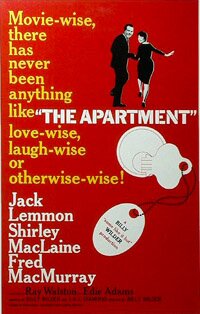Clever and sly, Witness for the Prosecution has the appearance of being a modest little film that manages to sneak up on you with great performances and a great ending.
The Apartment and the melancholy Billy Wilder
While Billy Wilder movies are often spoken of in terms of romantic comedies (which many of them are – kind of), the thing that most strikes me about them is the melancholy that informs them.
More often than not his lead characters are lonely and sad. The stories that unfold are usually ones where that isolation is alleviated and happiness, to varying degrees, is found at the end – which generally is the way romantic comedies unfold.
But the humour in his films is often mitigated by the quality of sadness. They are often amusing, even funny, but not terribly so because there is a constant awareness of the human drama underpinning everything.
In The Apartment we get a good example of this. It’s a very good movie. It’s a funny movie – but not wildly funny.
Everything is flavoured by the quality of sadness which comes from who Wilder’s main characters are and their lonely situation.
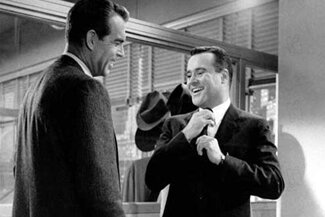 Jack Lemmon plays C.C. (‘Bud’) Baxter, a bachelor who is trying to get ahead in a large corporation. For a year now, he has been lending his apartment to the company’s executives (his seniors in the corporation; men with pull who can help his career). They use it for their romantic trysts – extramarital ones.
Jack Lemmon plays C.C. (‘Bud’) Baxter, a bachelor who is trying to get ahead in a large corporation. For a year now, he has been lending his apartment to the company’s executives (his seniors in the corporation; men with pull who can help his career). They use it for their romantic trysts – extramarital ones.
Baxter has no life himself, not beyond his job. He lives alone, stays late in the office, and often spends his evenings killing time waiting till his apartment is free to come home to.
Shirley MacLaine is Fran Kubelik, an elevator operator in the building Bud works in. She is also single. Though seemingly above the sexual shenanigans of the office, it turns out she is (or has been) the mistress of the company’s head executive (Fred MacMurray).
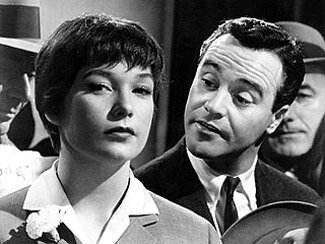 Despite the questionable decisions they have made (Baxter to use his apartment as he does, Fran to be someone’s mistress), they are the only two decent people in the office. (Neither is comfortable with their morally compromised situations.) It’s interesting, and likely deliberate, that with the exception of Fran and Baxter the office has no genuine, decent people but those kinds of people do exist outside of it (such as Baxter’s neighbour, the doctor).
Despite the questionable decisions they have made (Baxter to use his apartment as he does, Fran to be someone’s mistress), they are the only two decent people in the office. (Neither is comfortable with their morally compromised situations.) It’s interesting, and likely deliberate, that with the exception of Fran and Baxter the office has no genuine, decent people but those kinds of people do exist outside of it (such as Baxter’s neighbour, the doctor).
The consequences of the compromises Baxter and Lemmon make are tragic, even severe, but not insurmountable.
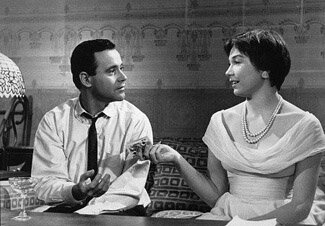 Both are lonely and miserable and both acquire an acute awareness of this through their growing relationship, primarily as friends (at least at the start of the relationship).
Both are lonely and miserable and both acquire an acute awareness of this through their growing relationship, primarily as friends (at least at the start of the relationship).
They find one another and this is what they need in order to get out of their situations – the strength and support they find in one another.
The Apartment is very good movie with a similar romantic theme to the later film, Avanti! Lemmon, MacLaine and MacMurray all give great and convincing performances.
(Originally posted 2003)
Links:
- The Apartment on Amazon (Collector’s Edition)
20 Movies: Sunset Boulevard (1950)
I keep hearing a song on the radio that begins, “I want to be a billionaire so freakin’ bad…” Well, be careful what you wish for. That’s sort of William Holden’s problem in Billy Wilder’s Sunset Boulevard.
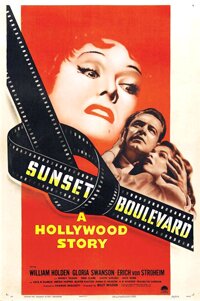 Sunset Boulevard (1950)
Sunset Boulevard (1950)
directed by Billy Wilder
We didn’t need dialogue. We had faces!
– Nora Desmond –
One of the best movies to ever come out of Hollywood is 1950’s Sunset Boulevard, a movie about Hollywood. It’s a kind of anodyne for the glamorous mystique of the movie business.
Interestingly, it takes core elements of Hollywood, romance and a degree of sentimentality, and, by turning them inside out, creates a noir film – cynical and dark yet just as romantic.
A struggling Hollywood writer (William Holden) is hard up for money, hiding from bill collectors and trying to hang on to what little he has, particularly his car. He hides out in run down looking mansion where he meets an aging silent film star (Gloria Swanson). He finds himself drawn into her world, one that’s fantastic and tinged by an element of madness.
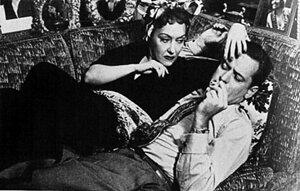 There are twin seductions occurring here: she is seduced by his youth and good looks, as well as by the thought that he might hold the key for her comeback.
There are twin seductions occurring here: she is seduced by his youth and good looks, as well as by the thought that he might hold the key for her comeback.
He, in turn, is seduced by the respite staying with her allows him, as well as the wealth he has access to by staying with her. In a sense, they corrupt one another, although both are well on the way already.
Eventually Holden winds up playing the part of gigolo as he helps her with a terrible screenplay (which she believes will re-establish her as Hollywood’s premier star). She, in turn, provides for him – a place to live, clothing, gifts and so on.
But everything is twisted, including Holden’s talent as a writer and his essential character.
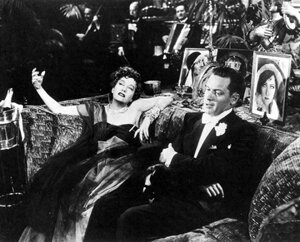 By compromising to get by, he compromises his better self and, even when he begins working secretly on a script worthy of his talents, that also becomes tainted by his moral lassitude.
By compromising to get by, he compromises his better self and, even when he begins working secretly on a script worthy of his talents, that also becomes tainted by his moral lassitude.
It’s a movie about Hollywood’s compromises and the essential deception between what is presented on screen and the manner in which films are made. In other words, there is a moral disparity between public display and private actions.
From the start, in his opening voice over, Holden’s character is cynical. There is humour here, and throughout the film, but it is dark and bitter. But even from the story’s beginning we see what has happened to Holden in terms of moral compromise.
There is an early scene where a script of his is turned down, briskly brushed off as lame by an efficient, attractive script-reader (Nancy Olson). But from the scene, through Holden’s words and action, we know why the script is turned down – it isn’t true. It’s compromised writing.
It is the script of someone writing what he thinks someone else wants to hear rather than what is true to him as a writer.
His talent, like his character, is degrading beneath his desire to succeed at any cost.
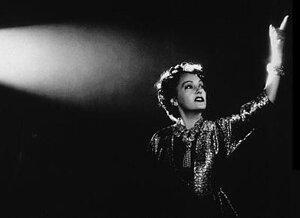 From the humour he uses, you also know that he is aware of this on one level but casually dismissive of it on the surface.
From the humour he uses, you also know that he is aware of this on one level but casually dismissive of it on the surface.
He doesn’t want to face what he knows is happening to himself, so he hides it beneath cynical wise-cracks.
In the character of Swanson, we see what is likely the result of Hollywood’s culture of compromise and pursuit of success – the dismissed artist dissolving into madness.
It’s a brilliant film, one of the best noir pieces ever, one of the best movies ever. It somehow manages to balance a number of elements – mystery, romance, humour and horror.
The movie also takes the interesting approach of basically telling us the ending at the beginning.
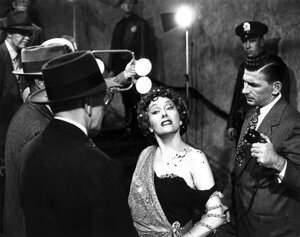 The film is thus not so much about what happens as it is why it happens. It’s the “why” that holds the film’s critique of Hollywood and, more broadly, the desire to succeed.
The film is thus not so much about what happens as it is why it happens. It’s the “why” that holds the film’s critique of Hollywood and, more broadly, the desire to succeed.
With the DVD, we get a great transfer – the movie looks great. There are also a number of excellent features on the disc, a nice plus for an older movie. (With many older films all we get are trailers.)
If you haven’t ever seen Sunset Boulevard, what are you waiting for? It is one of the great films and, now, it’s available on a great DVD. (Refers to the 2002 Special Collector’s Edition.)
See: 20 Movies – The List
Sunset Boulevard (the trailer)
Marilyn Monroe: the River and the Itch
 Some decisions don’t work as well as you would like. In fact, they can work against your intentions.
Some decisions don’t work as well as you would like. In fact, they can work against your intentions.
For a variety of reasons I’ve had difficulty lately getting back into my movie watching routine which used to be almost a movie a night. The reviews I’ve written account for only a small number of the movies I’ve actually watched. I had the best intentions but I never did write about a great movie, The Contender (2000). Or do that review of all three Bourne movies.
I tried to kickstart things last night by watching The Seven Year Itch (1955). Bad idea.
I was hoping to watch something fabulous to reinvigorate my movie watching habit. It didn’t work out that way. My choice was poorly made. A bad decision. Although, there is the possibility it worked in an “end around” kind of way. Maybe it will kickstart things by focusing me on finding something fabulous. God knows, I know they are there. I think I’ll try again tonight. If you’ve any suggestions on what to watch, feel free to pass them along in the comments. In the meantime …
I did post a few reviews, including one I wrote this morning on the above mentioned movie. Those reviews are:
- The Seven Year Itch (1955)
- River of No Return (1954)
A couple of notes … if you’re not aware, you may be interested to know The Seven Year Itch was directed by Billy Wilder, script by George Axelrod and Wilder. And River of No Return stars Marilyn Monroe and Robert Mitchum.

